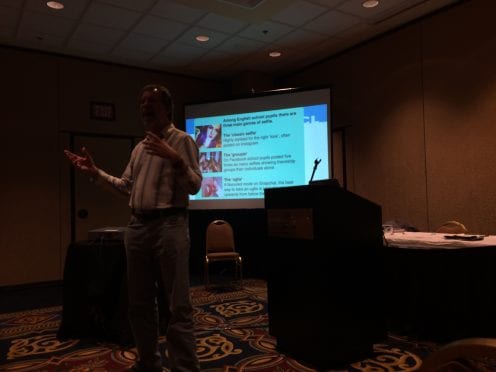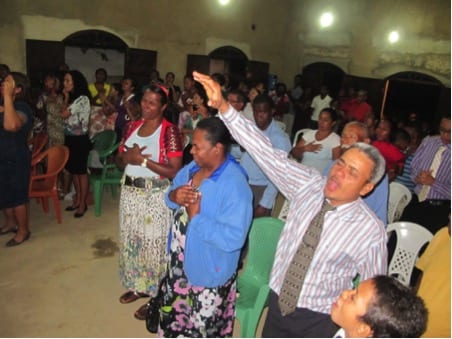“The Value of Social Media” at the AAA conference
By ucsanha, on 10 December 2016

Daniel Miller talking at the AAA conference. Photo by Nell Haynes.
From the Why We Post Team, Nell Haynes, Tom McDonald, and Daniel Miller attended the American Anthropological Association conference in snowy Minneapolis, Minnesota, USA at the end of November. All participated in a session organized by Heather Horst, and Robert Foster, titled “The Value of Social Media.” The session explored the use and meaning of social media through anthropological conceptions of value, which have advanced our understanding of practices that are meaningful to people and the worlds they inhabit.
Danny began the session with his talk on how social media may be used to create anthropological value. He related his ideas to those of Nancy Munn’s early anthropological research on the Trobriand Islands in which she suggested that social relations expanded an individual’s or group’s status, while something like witchcraft shrinks it. Indeed, the idea of anthropology is to expand knowledge, but there exist “witches” that work in contrast. He suggested these witches include obfuscating language, the tendency of anthropologists to be very individually focused, and the idea of criticism and critique without regard for actual solutions. But, he suggested that social media is a key way in which anthropologists might find value in their work. Both as a topic and as a medium for reaching wide student audiences, social media may actually demonstrate that anthropology helps us to understand the contemporary world, as well as become the means through which students from across the world can connect to other students, engage in discussions about anthropology, on platforms like FutureLearn and UCLeXtend, where the Why We Post Project’s online courses are based.
Nell Haynes used her fieldwork in Northern Chile to explore ideas of value that are not necessarily based in economics and currency. Looking at adult women who sell used clothing and home items through Facebook pages, Nell explained that the motivation for these women was not increased income, but social connections with other women that they create through their commercial activity. In essence, social media has opened not only new spaces for economic activity, but has given opportunities to women whose social worlds were once more confined to the family. For these older women, the “value” of their economic pursuits on social media do not correspond to the exchange value of the goods they sell, but rather the value of the social relationships gained, sustained, and strengthened through selling.

Tom McDonald talking at the AAA conference. Photo by Nell Haynes.
Tom presented on his research in Rural China, examining how hierarchies become overtly expressed on China’s most popular social media platform – QQ – in the form of level status conferred upon users through collecting points and virtual currency. He discussed the changing attitude of rural Chinese townsfolk towards these levels, showing how desires to accumulate levels influence their practices of internet use in everyday life, giving a cultural explanation for the appeal of these systems. In fact, users’ accounts of level accumulation cross between emphasizing honest effort and intentional distortion, and in so doing place value on the practice’s aspect of self-cultivation. Tom argued that individual internet users are able to transform social media use from a wasteful habit that incurs the disapproval of other family members into a virtuous activity.
The session was well-attended and inspired rousing discussion about a topics ranging from the role of critique in anthropology, to the ways that algorithms may influence social media users. Later in the day, with an equally exciting crowd, Danny presented on the project as a whole and the ways in which the anthropology of social media contributes to broader understandings of the discipline as well as understanding what it means to be human. In his talk, the keynote address for DANG or the Digital ANthropology Group of AAA, he focused on the “theory of attainment,” which posits that rather than suggesting, with each technological advancement we decry “the end of humanity” or entering a “post-human state,” instead what we define as human must take technological advancement into account. As such a definition of humanity takes into consideration human’s persistent ability to attain new advancement.
Overall, it was a productive and informative conference. Tom, Nell, and Danny only wished that more of the team could have been there with them.
 Close
Close






















